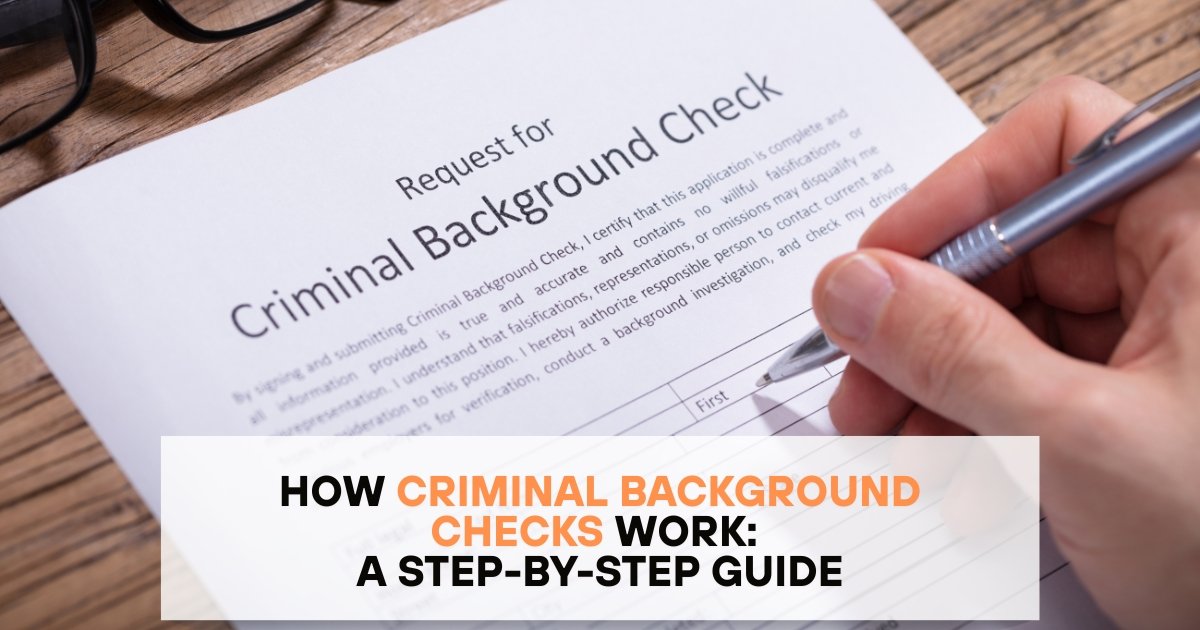How Criminal Background Checks Work: A Step-by-Step Guide

Hiring, background checks, and finding safe places to work are all important parts of securing safe environments. Here’s How Criminal Background Checks Work: A Step-by-Step Guide, so you know what it’s about, what it’s about, and what it’s about. You’ll be able to make informed decisions if you know how to conduct a criminal background check.
How Does a Criminal Background Check Work?
If you have any past offenses or convictions, a criminal background check is a way to check their record. Employers, landlords, and other organizations use this process to make sure people are safe and trustworthy before signing anything. You’ll get a good idea of what’s involved in a criminal background check by reading How Criminal Background Checks Work: A Step-by-Step Guide.
What’s the point of criminal background checks?
I want you to understand why criminal background checks matter before we go into details. Knowing an employee’s background can keep businesses safe from theft, fraud, and violence. For landlords, ensuring a tenant has a clean record can help keep the neighborhood safe.
The First step is Permission to run a criminal background check
. Before any background check can be initiated. The individual being checked must consent. This consent ensures that the check is legal and that the person is aware of it.
With How Criminal Background Checks Work: A Step-by-Step Guide, businesses can be transparent about why they’re doing background checks and how the information will be used.
The Second step is Choose the type of criminal background check you want
There are different types of criminal background checks, including:
- Criminal Record Check (CRC) – This check tells you if someone has ever been convicted of a crime in Canada.
- The National Criminal Record Check searches all federal and provincial databases across Canada.
- For positions involving children or vulnerable people, this is a more detailed check.
Choosing the right type of background check depends on the job or purpose. How Criminal Background Checks Work: A Step-by-Step Guide explains how they work.
The third step is Submitting your info
You’ll need to submit a lot of information after choosing the type of check. That includes:
- Name in full
- Birthdate
- History of addresses
- ID from the government
Businesses can conduct the check themselves or use a service like Crimcheck Canada to simplify the process.
The fourth step is to look up your criminal history
In the data is cross-referenced with local, provincial, and federal criminal records databases. Police departments are responsible for maintaining these databases, which contain information about past convictions, ongoing cases, and arrest records.
The depth of the search depends on the kind of criminal record check you do.
The 5th step is Receiving the results
The results are compiled once the search is done.
- “No criminal record – The person has not previously been convicted.
- Criminal record – The person has a criminal record.
The results will also show any convictions and sentences, and indicate whether the person is on probation or has received a pardon.
The 6th step is to interpret the results
A Step-by-Step Guide tells you what to look for, including how to interpret the results. The context of the crime, the time that has passed, and the nature of the job or role all matter. Not all offenses disqualify someone from a job or opportunity.
The final (7th) step is Decide
Businesses and landlords have to make a final decision based on criminal background checks.
- If there are no major issues with the background check, hire or rent.
- Decline the opportunity if you discover serious criminal offenses that could compromise the business or property’s safety.
You can get legal advice if you’re not sure how to handle a negative report.
Criminal background checks: pros and cons
Criminal background checks have benefits and drawbacks.
The pros:
- Prevents the hiring or trusting of people with dangerous criminal histories in sensitive positions.
- Mitigation: Helps businesses minimize fraud, theft, and violence.
- Provides peace of mind to individuals and organizations.
The cons are:
- Some people may feel uncomfortable sharing or reviewing their information.
- Running a thorough criminal background check can take a while.
- Screening systems can wrongly flag people for criminal activity, causing unnecessary complications.
The pros and cons of How Criminal Background Checks Work: A Step-by-Step Guide will help you navigate the process.
Online Criminal Background Checks in Canada
Today, many people and businesses use online services to conduct criminal background checks. How Criminal Background Checks Work: A Step-by-Step Guide includes websites that allow quick, reliable searches.
The Crimcheck Canada website offers simple, easy-to-use tools for performing background checks, ensuring compliance with Canadian law.
In conclusion
For anyone who needs to conduct criminal background checks, How Criminal Background Checks Work: A Step-by-Step Guide is a great resource. A smooth and effective process doesn’t matter if you’re an individual, a small business, or a big company.
The ability to run these checks online allows businesses and individuals to make informed decisions, reduce risks, and keep their environment safe and secure. If you want to learn how criminal checks work in Canada, check out How Criminal Background Checks Work: A Step-by-Step Guide.
Follow Crimcheck Canada on Facebook for more updates.




